
A U.S. drone strike in Pakistan has reportedly accidentally killed two hostages who were being held captive by al-Qaeda. The White House says U.S. government contractor Warren Weinstein and Italian aid worker Giovanni Lo Porto were killed in the border region of Afghanistan and Pakistan in January. On Thursday, President Barack Obama took “full responsibility” for the botched operation and described it as a painful loss he profoundly regretted. According to the White House, the operation also reportedly killed an American al-Qaeda leader, Ahmed Farouq. A separate strike apparently killed another American al-Qaeda member, Adam Gadahn. Despite hundreds of hours of surveillance, the White House said it had no reason to believe the U.S. and Italian hostages were being detained in the al-Qaeda compound targeted during the operation. “In neither of the strikes … did the government actually know who it was killing,” says Jameel Jaffer, deputy legal director of the ACLU. “Yesterday’s disclosures just provide more reasons to question what kinds of regulations the government has governing these strikes.” The botched operation comes on the heels of a new report chronicling civilian deaths from U.S. drone strikes in Yemen.
Transcript
AMY GOODMAN: We’re on the road in Denver, Colorado. President Obama has apologized after the White House revealed a U.S. drone strike killed an American government contractor and an Italian aid worker held hostage by al-Qaeda in January. Despite hundreds of hours of surveillance and near-constant visibility of the al-Qaeda site, officials said they did not know the hostages were there. Officials said the strike also killed an American linked to al-Qaeda, Ahmed Farouq, while another American al-Qaeda member, Adam Gadahn, was killed in a separate strike. Obama apologized to the families of hostages Warren Weinstein and Giovanni Lo Porto.
PRESIDENT BARACK OBAMA: I want to express our grief and condolences to the families of two hostages—one American, Dr. Warren Weinstein, and an Italian, Giovanni Lo Porto—who were tragically killed in a U.S. counterterrorism operation. As president and as commander-in-chief, I take full responsibility for all our counterterrorism operations, including the one that inadvertently took the lives of Warren and Giovanni. I profoundly regret what happened. On behalf of the United States government, I offer our deepest apologies to the families.
AMY GOODMAN: The U.S. counterterrorism operation has reportedly accidentally killed two hostages that were being held captive by al-Qaeda—again, U.S. government contractor Warren Weinstein; an Italian, Lo Porto.
We’re joined right now by Jameel Jaffer, who is the deputy legal director of the ACLU.
We welcome you to Democracy Now!, Jameel. Talk about this latest revelation.
JAMEEL JAFFER: Well, you know, I think it provides us with more reasons to question the strength and the reliability of the intelligence that the government is relying on to conduct these drone strikes. You know, in neither of the strikes that the government disclosed yesterday did the government actually know who it was killing. It wasn’t until after—and in one case, until weeks after—the strike that the government actually figured out who had been in the sights of the drone operators. And that, I think, is pretty troubling. You know, we’ve seen over the last few months—over the last couple years, repeated instances in which the government, despite committing itself to applying the most stringent standards, has ended up killing civilians in drone strikes. And it happens over and over and over again. And I think that yesterday’s disclosures just provide more reasons to question what it is, what kinds of regulations the government has governing these strikes.
AMY GOODMAN: Can you explain who these two men are—the American government contractor, Warren Weinstein, and the Italian aid worker, Giovanni Lo Porto?
JAMEEL JAFFER: Right. Well, they were being held hostage, and apparently were held in this al-Qaeda compound. According to the government, the drone operators who were surveilling the compound didn’t realize that the hostages were held there, despite having conducted surveillance over a period of at least more than a week, I think. And it was only after the strike was carried out that—when the government saw that six bodies were being taken out of the compound rather than just the four they expected, that they realized that they had killed two people they hadn’t known were even there. And it was only later that they determined that those two people were the hostages.
You know, it’s obviously a very sad thing. These were entirely innocent people, and nobody is suggesting that the government had any idea they were there, but it does—it does lead one to question again the standards that the government is applying. And I think it leads one to question how much the drone operators actually know before they pull the trigger. And if this were an isolated event—I mean, it’s isolated in the sense that we ended up killing hostages, but it’s not isolated in the sense that we have—there have been many previous strikes in which the drones ended up killing civilians. And that’s something that I think that the country hasn’t really confronted.
AMY GOODMAN: Can you explain also who the American linked to al-Qaeda, Ahmed Farouq, and another American al-Qaeda member, Adam Gadahn, were, killed in a separate strike?
JAMEEL JAFFER: Yeah, I mean, I think we—we don’t know a whole lot about them. I mean, these are two Americans who are said to have gone and joined forces with al-Qaeda. Adam Gadahn is somebody who was a spokesperson for that organization. You know, according to the government, neither of these Americans was targeted. And again, it was only after the strikes that the government determined that those Americans were actually there. So, you know, once again, I think that it provides reason to question how much information the drone operators have before they’re actually carrying out these strikes. You know, I guess one other—
AMY GOODMAN: Jameel Jaffer, what are your—go ahead.
JAMEEL JAFFER: Well, I was just going to say that one other thing that’s remarkable about yesterday’s disclosures is the very fact of the disclosures, because normally the government doesn’t disclose information about individual drone strikes, at least not on the record like this. This is a very unusual thing, where the government is actually disclosing information about who was killed and a little bit of information about the operation. You know, with the vast majority of drone strikes, we don’t get that level of transparency. I wish we did. We still don’t know—we don’t have the government’s information, the government’s statistics about civilian casualties, and the government is still withholding even basic information about the legal framework for the program. The Justice Department memos, for example, are still being withheld, with the exception of two memos, that relate to killing U.S. citizens, but there are eight memos that the government is still withholding, despite three or four years of litigation by the ACLU and by The New York Times.
AMY GOODMAN: Has Warren Weinstein’s family spoken out?
JAMEEL JAFFER: You know, I did see one statement by Weinstein’s family. You know, it was a very, very sad statement, obviously. The family is devastated by the news. I think that they were holding out hope that Mr. Weinstein would be rescued. And I think one can very readily understand why the family is so devastated by the disclosures of yesterday.
AMY GOODMAN: I want to turn back to President Obama with more of his apology when it was revealed that the U.S. had killed these two hostages in the drone strike in Pakistan back in January.
PRESIDENT BARACK OBAMA: As soon as we determined the cause of their deaths, I directed that the existence of this operation be declassified and disclosed publicly. I did so because the Weinstein and Lo Porto families deserve to know the truth. And I did so because, even as certain aspects of our national security efforts have to remain secret in order to succeed, the United States is a democracy, committed to openness in good times and in bad.
AMY GOODMAN: Jameel Jaffer, can you respond to President Obama talking about this democracy committed to openness?
JAMEEL JAFFER: Well, I mean, I guess I have mixed feelings about that particular statement. You know, as I said, the president made that statement in the context of disclosing information about a drone strike, or about two drone strikes. And I think the president was right to make those disclosures. On the other hand, it’s very hard to square that statement, that we’re committed to openness, with the government’s record on the drone program more generally. You know, the government doesn’t release information about who it’s targeting. It doesn’t release information about civilian casualties. It doesn’t even release those kinds of statistics long after the strikes. All of that information is kept secret, except in the cases in which intelligence officials make off-the-record or not-for-attribution disclosures to the press.
And as I mentioned, the legal memos, which are really the law of the targeted killing program, are still being withheld from the government. Until very recently, the CIA’s position in court was that the agency couldn’t disclose even whether it was involved in a drone program at all, which is obviously an absurd position, given how much is written about this program in the newspapers. But the administration has been taking this very hardline position with respect to transparency around the drone program, releasing almost no information. The memo that was released last year, the Office of Legal Counsel memo that related to the killing of Anwar al-Awlaki in 2011, that memo was released only after three years of litigation and two appeals courts decisions holding that the government secrecy was unlawful. And even after the disclosure of that memo, the government continues to withhold the other memos that apply to strikes that don’t involve U.S. persons, and obviously those strikes account for the vast majority of drone strikes in Pakistan, in Yemen and in Somalia.
So we really have a program that is cloaked in secrecy, even now. The public is heavily reliant on information released by the government itself, and the government itself quite often cherry-picks information, releasing only the information that casts the program in the most favorable light. So, while I—you know, I suppose, I applaud the president for stating that the government is committed to transparency, I question whether the government’s actions actually reflect that commitment.
AMY GOODMAN: On Thursday, ABC News reporter Jonathan Karl asked White House Press Secretary Josh Earnest about the legal justification for killing an American citizen said to be a member of al-Qaeda.
JONATHAN KARL: Is it legal—under the guidelines that this administration has put in place, is it legal to kill American citizens who do not represent an imminent threat of violent attack against the United States?
PRESS SECRETARY JOSH EARNEST: What is permissible, under international law and in the protocol that the president has established, is for the United States to carry out strikes, to carry out operations against al-Qaeda compounds that we can assess with near certainty are al-Qaeda compounds that are frequented by al-Qaeda leaders. And that is the operation that took place. And that operation did result in the death of al-Qaeda fighters and al-Qaeda leaders who were in this al-Qaeda compound.
JONATHAN KARL: But would it have been illegal for you to intentionally target those two men?
PRESS SECRETARY JOSH EARNEST: Well, there is a separate procedure and protocol for specifically targeting American citizens.
AMY GOODMAN: Jameel Jaffer, can you explain?
JAMEEL JAFFER: Sure. You know, I think there’s a lot of confusion here about what procedures the government is actually applying in what places. The president announced in May of 2013, during a speech at the National Defense University, a series of procedures that the government would comply with when it used lethal force, when it used armed drones to carry out these strikes. And one of the things that the president said was that we would not use lethal force unless there was a near certainty that no civilians would be killed. Now, the understanding was that that standard was going to be phased in and that it would apply outside zones of active hostilities. But there’s a lot of uncertainty about precisely where that standard is being applied.
And even where it’s clear that that standard is the one that’s supposed to be governing the government’s actions—for example, in Yemen—we see repeatedly these instances in which U.S. drones end up killing civilians. And just last week or the week before, the Open Society Justice Initiative released a report that discusses nine drone strikes, or nine incidents in Yemen, in which drones ended up killing civilians. And some of those incidents post-dated the president’s May 2013 speech. And so, even where it’s clear that that near-certainty standard is the one that the government says is applying, we see these repeated instances in which civilians are being killed.
So it’s hard to understand. You know, I think there’s a question for us: Is the government really applying that standard in those places? And if it is, then is the government using these words in ways that are different from the ways we ordinarily use them? Because “near certainty” is hard to reconcile with the number of civilian deaths that are being reported.


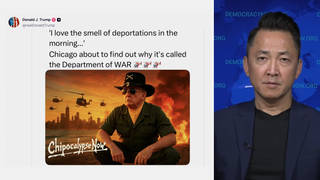
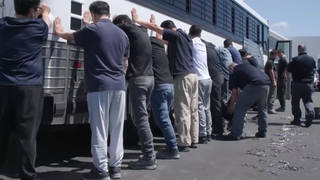
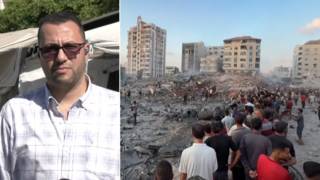





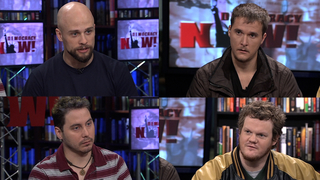
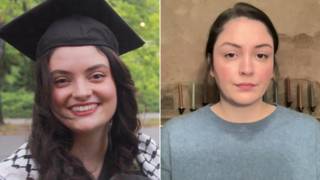
Media Options